Gonzalo Farias may well be the busiest musician in Kansas City. The Chilean-born conductor, who this fall assumed the post of David T. Beals III Associate Conductor of the Kansas City Symphony, conducts dozens of concerts on the Family, Pops, Holiday, and Film + Live Orchestra Series, and he leads educational concerts that reach some 30,000 students each year.
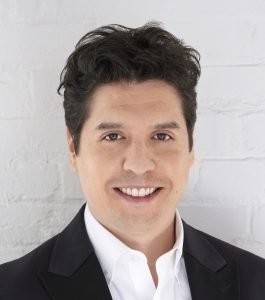
Gonzalo Farias
In May alone, he’ll conduct Disco Inferno: A ‘70s Celebration, Get Happy: A Judy Garland Centennial Celebration, and The Princess Bride in Concert featuring the Rob Reiner film. And that’s just the beginning. Each season Gonzalo must prepare a huge stack of orchestral scores in order to be able to step in at the last minute for the conductor on the Symphony’s Classical Series.
Raised in culture-rich Santiago, Gonzalo showed enormous promise on the keyboard as a child and earned a bachelor’s degree in piano from Chile’s Catholic University. At Boston’s New England Conservatory, he pursued graduate studies in piano with Wha Kyung Byun and Russell Sherman.
Turning to conducting, he studied with Donald Schleicher at the University of Illinois and Marin Alsop at Peabody Conservatory, and worked privately with Larry Rachleff, Otto-Werner Mueller, Jaap Van Zweden, Neeme and Paavo Järvi, and Johannes Schlaefli. Among his many awards are the first prize at the prestigious Claudio Arrau International Piano Competition and prizes at the Maria Canals and Luis Sigall Piano Competitions. He was a two-time recipient of the Bruno Walter Memorial Conducting Scholarship at the Cabrillo Music Festival.
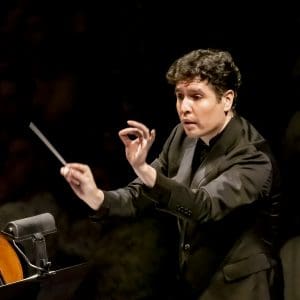
Photo by Eric Williams
Before arriving at the Kansas City Symphony, Gonzalo was music director of the Joliet Symphony Orchestra, assistant conductor of the Virginia Symphony, and associate conductor of the Jacksonville Symphony. Recently, the conductor was gracious enough to answer a few questions about his life and work.
How many full programs do you perform and/or prepare each season for the Kansas City Symphony?
We get to do around 50 concerts together each season.
In addition to conducting in the genres of family, pops, holiday, and film, and “covering” the Classical Series, what are some aspects of this job the public might not know about?
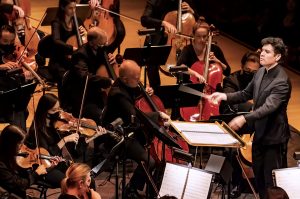
Gonzalo Farias conducts the Kansas City Symphony in some 50 concerts per season. / Photo by Eric Williams
Concerts are the most important part of what we do, but it’s just part of the work. Studying scores is a major component, but having rehearsals, meeting soloists, being part of meetings, researching and doing programming, and writing/learning scripts, are all equally part of the preparation.
Outside of preparing concerts, we are also part of the musical community in Kansas City. I’ve been part of the campus-wide Leadership Series at The University of Kansas Medical Center, speaking on different kinds of leadership styles, I’ve judged at the UMKC and Young Artist Concerto Competition, and I get to talk to a lot of people outside of concerts, sharing what we do at the KC Symphony. Surprisingly, there are still a lot of people who are not fully aware of the caliber of artistry that Kansas City has in its Symphony.
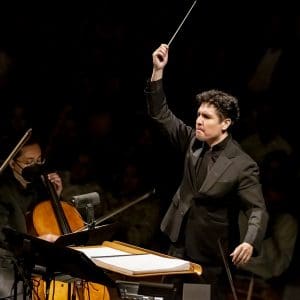
Photo by Eric Williams
Is it a given that the ultimate goal of most assistant and associate conductors is a music directorship?
I think conducting is one of the few professions that you can only learn by doing. So to be able to conduct professional musicians at the level of the Kansas City Symphony, you can only learn by doing just that. Assistant conductor positions definitely help one gain experience and knowledge, but one’s own path is carved by one’s own desires, work, opportunities, and luck.
What are the things about this job (Pops, Film, Education) that make you a better musician overall?
I was lucky to have studied how to make music, as a pianist, for many years. I believe conducting only reveals how much music you have inside and how much you are able to share that. At the same time, the opportunity to watch, conduct, and understand the work of professional musicians is extremely important to forge your own approach to conducting.
Conducting is always a balancing act between bringing your own vision and creating bridges with orchestra musicians. Each concert is an opportunity to create those bridges so we can understand, appreciate, respect, and express ourselves better together. That is the best way to be a better conductor.
What were the early formative experiences that made you want to become a musician, that sparked the idea of a career?
There were a few crucial experiences in my life. I took harmony classes at my local university when I was 14 and those revealed the immense power and message that music can have. I felt incredibly compelled to follow those and ultimately it felt like a duty or a call for me.
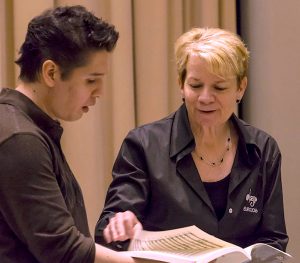
Gonzalo Farias with one of his musical mentors, Conductor Marin Alsop
My first piano teacher gave me a sense of security and belief that my own voice was meaningful. My piano teachers in Boston gave me the tools to think, feel, and deeply connect with music. The strangest thing is that I always knew, since I was a little boy, that conducting was my dream, that it was the path to follow. I still think this way, seeing how music informs life, its community, and the quest to find your own meaning inside of it. … Music is much more about people than sounds.
What made you pivot from piano to conducting, and how hard is it to maintain both?
My piano training was very rigorous and gave me the tools to interpret and understand music-making. However, my ultimate dream was always conducting. Piano playing was a step towards it. When life finally gave me a chance to do it, I felt at home with the incredible complexity of conducting.
Why are some people able to grasp the spiritual aspect, or higher dimension, in music, and others aren’t? Can anybody be taught to?
I think it’s misleading to think of higher or lower dimensions in art. That notion disassociates music into good or bad, judging what one should or not get, understand, or aspire to as a listener. I think accepting what one perceives in music (or in art/life) allows curiosity to be present and real. That curiosity is the fuel for composers to find themselves and their own voices. That same curiosity is the one that will inform you of the many different aspects of music and how meaningful those can be to you personally. However, that is an extremely personal process.
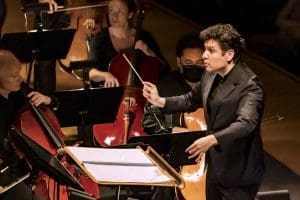
Photo by Eric Williams
I believe that process can be taught, enhanced, and accompanied by good instruction, but above all, by acceptance and love for one’s own likes, desires, and imagination. I see, feel, and recreate the love in Beethoven’s music, the genius of Gustav Mahler, but it’s because of my own personal journey with them.
One of the most meaningful and beautiful journeys in life is to find who you are, what you love, to find your own hows and whys. Music is one of those special personal avenues. Ultimately, music is a mirror of who we are, and the main reason why conducting is so compelling to me: the chance to be able to accompany you on that journey alongside my own journey.
—By Paul Horsley
For Kansas City Symphony tickets, call 816-471-0400 or go to kcsymphony.org. To reach Paul Horsley, performing arts editor, send an email to paul@kcindependent.com or find him on Facebook (paul.horsley.501) or Twitter/Instagram (@phorsleycritic).